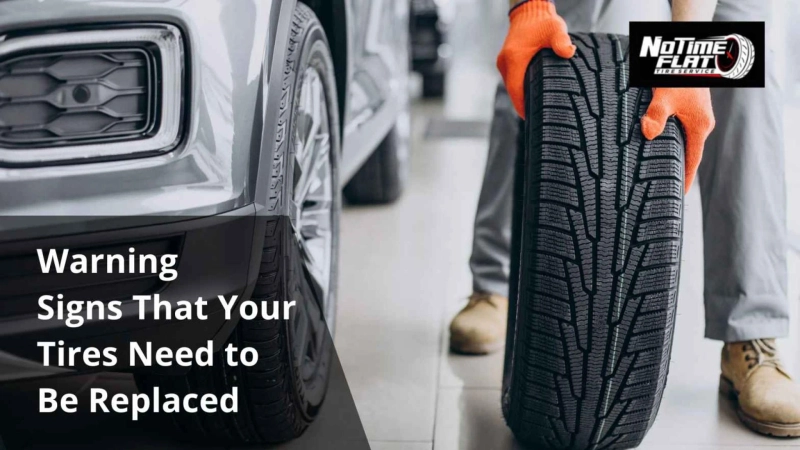Your tires are the most essential safety feature of your car because they are the only parts that make direct contact with the road. It is necessary to confirm that your vehicle has tires that can handle the challenge. Did you know that under normal driving conditions, car tires wear out after three to four years? After five to six years, they should undergo annual inspections, and after ten years, regardless of their condition, you may need tire replacement. Regular maintenance is required to avoid dangerous situations caused by worn-out tires. In this post, we will check out the common warning signs your tires need to be replaced.
How to Check if Your Tires are Still in Good Condition?
If you want to make sure that your tires are still in good shape, there\'s a simple test you can do. Take a penny, preferably an American one, and place it between the tread blocks of your tires. Make sure that Lincoln\'s head is facing towards the tire, and then examine the tread. Can you see the top of Lincoln\'s head? If you can, it means your tires are worn out and need tire replacement. Yet, if the tread covers the top of Lincoln\'s head, it indicates that at least 2/32nds of an inch of tread remains.
Your safety and the safety of your passengers depend on the condition of your tires. If you\'re unsure about their condition or if it\'s time to get new tires for your car, truck, van, or SUV, we\'re here to help. No Time Flat can assist you in inspecting your tires and providing advice. If you decide to get your tires replaced, check out the online tire store for a selection of affordable tires.
When to Replace Tires? Signs of Bad Tires That Suggest a Replacement
Learn how to tell if your tires need to be replaced. From tread wear tests to identifying tire age, ensure your safety on the road.
When Your Tires Lack Grip
Some tires, even when new, can feel slippery on dry roads. Your safety behind the wheel depends on having tires that provide a reliable grip. For example, summer-only tires won\'t perform well in winter conditions. If your current tires don\'t give you the confidence you need, it\'s time for a change.
Uneven Tire Wear Means Replacement
Tires that wear unevenly make it harder to stop your vehicle quickly. This uneven tread wear is often a sign that your vehicle needs alignment. By replacing tires with uneven tread, you can hit the road with confidence, knowing your car\'s tires won\'t fail you when it matters most.
Listen for Tire Noise While Driving
If you hear unusual noise while driving, it could be bad tire signs. Lower your windows and turn down the radio to listen closely. Tire noise can result from excessive wear, causing increased contact between the tire and road surface. Differentiating between tire noise and road noise can help identify possible issues.
Watch Out for Bulges or Cracks
Cracks or bulges in tires can occur when temperatures drop, especially during winter. A few winters can lead to sidewall cracking. Bulges often indicate trapped air between the tire lining and outer rubber. If you notice any cracks or bulges, it is suggested that you bring your vehicle to No Time Flat for tire inspection, repair, or replacement.
Frequent Air Pressure Problems
While occasional low tire pressure is normal, repeated air pressure issues in winter can be troublesome. They may indicate a puncture in your tire. Get in touch with the tire team for guidance and refer to your vehicle\'s recommended PSI. Sudden drops in PSI should be a concern, as they may indicate a hole. Inspect your tires for debris, holes, or foreign objects, and consult a professional if it\'s more than a simple patch job.
TPMS Warning Signs
Your car\'s tire pressure monitoring system (TPMS) alerts you if your tires are severely under-inflated, which can be dangerous. If you suspect a faulty TPMS, visit your tire pressure monitoring service centre to diagnose the issue. They can check your TPMS and tires to ensure accuracy. If the TPMS warning lights persist, a more comprehensive inspection of your car systems may be recommended.
Dealing with Vibrations
Vibrations are a common sign of tire problems. If you experience frequent vibrations, especially at high frequencies, it could indicate tire damage, suspension issues, or misalignment. Professional tire services experts can analyze your vehicle\'s tires and determine if any problems need to be addressed for a smoother ride.
Tires Showing Bubbles or Blisters
Tires with bubbles or blisters need immediate replacement. Bubbles indicate interior tire damage, often caused by hitting curbs or objects. Check your warranty as you may not have to bear the full cost of new tires. Additionally, bulges and blisters on the sidewalls can compromise tire safety. If you notice tears or irregular bumps, it\'s crucial to replace your tires to avoid accidents or flat tires.
The Symptoms of Tire Age
If you\'re unsure about the tire age and expiry date, check your records. It\'s better to be proactive and replace old tires before they pose safety risks like flats or blowouts. Typically, new tires last around three to four years, but frequent high-speed driving may shorten their lifespan. Visit our team to assess if it\'s time to replace your aged tires for a safer journey.
Weathering and Tire Condition
Tires endure harsh weather conditions, from scorching summer heat to wet rainy days, which can cause degradation. Rubber naturally breaks down over time, especially when exposed to the elements. Watch out for signs to replace tires such as cracks between tread blocks and sidewalls, as they indicate weathering. If internal materials are exposed, it\'s important to replace your tires promptly for optimal safety on the road.
Trust Professionals for New Tires and Service Needs!
Your safety on the road depends on quality tires that provide reliable control and comfort. No Time Flat understands the importance of choosing durable tires for replacement. The wide selection of tires, ranging from passenger cars to heavy equipment vehicles, ensures that you\'ll find the perfect one at an affordable price.
The tire technicians will assist you with checking tread depth, monitoring tire pressure, and determining the ideal time for replacements. If you\'re experiencing any signs of bad tires or know your vehicle needs new ones, rely on these experts for new tires and tire installation service. Drive with confidence, knowing that the pros have your tire needs covered.


